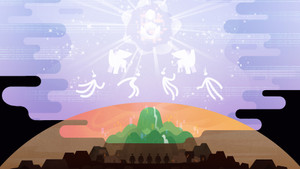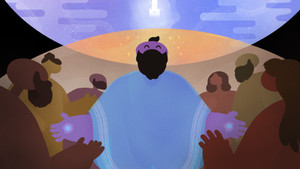

God
The God portrayed in the Bible isn’t easy to understand, but what if we could better understand what it is that we can’t understand? In this video, we will explore the complex identity of God displayed in the storyline of the Bible. This helps us understand the huge role Jesus came to fulfill, one with the Father and distinct as the Son.
Reflect
Compare and contrast Genesis 1:1-3 and John 1:1-5. How is God described in these two passages?
Let’s read Proverbs 3:19, Exodus 35:30-32, and Colossians 2:2-6. Consider how God’s triune being uses wisdom to build up places where he can be with his people in unity. What do you observe?
Check out Daniel’s vision of God in Daniel 7:9-14. What do you think Jesus is connecting to when he identifies himself as the Son of Man in John 9:35-38?
Note some of the ways we are invited to partner with God’s royal and triune identity according to John 15:9-12, Philippians 2:5-11, and Ephesians 1:15-23. Discuss examples of what God’s partners are invited to imagine, trust, speak, and do in these passages.
Take time to discuss other themes, questions, or key takeaways from what you learned together.
Downloads
Next Episode

Episode 2
Intro to Spiritual Beings
God and Spiritual Beings

Episode 1
God

Episode 2
Intro to Spiritual Beings

Episode 3
Elohim

Episode 4
Divine Council

Episode 5
Angels and Cherubim

Episode 6
Angel of the Lord

Episode 7
The Satan and Demons

Episode 8